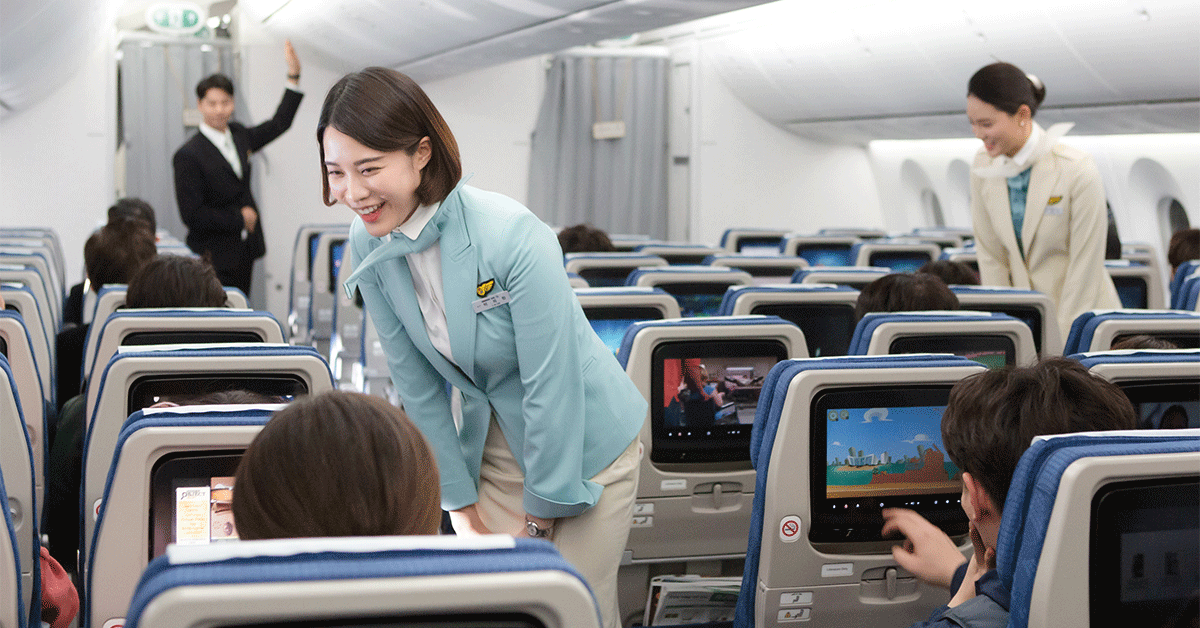Access selected deals available with budget and full-service airlines
Lock any airfare that sounds great. You don’t lose anything if you cancel it
Call us anytime for any assistance. We do not go into hibernation
Your personal and financial information stays secure with us
Korean Air Co., Ltd., operating as Korean Air, is South Korea’s flagship carrier and largest airline, headquartered in Seoul, South Korea. Founded on March 1, 1969, as a successor to Korean Air Lines (established in 1962), it is a privately owned airline under the Hanjin Group, with its main hub at Incheon International Airport (ICN) and a secondary hub at Gimpo International Airport (GMP). As a founding member of the SkyTeam alliance since 2000, Korean Air operates an extensive network of over 120 destinations in 43 countries across Asia, North America, Europe, Africa, Oceania, and the Middle East. Renowned for its premium service, modern fleet, and commitment to safety, Korean Air is a global leader in passenger and cargo transport, carrying over 27 million passengers and 1.6 million tonnes of cargo annually (as of 2024). Its slogan, “Excellence in Flight,” reflects its focus on quality, innovation, and Korean hospitality, earning accolades like the Skytrax 5-Star Airline rating (2023, 2024) and World’s Best Airline Cabin Crew (2024).

Korean Air traces its roots to Korean Air Lines, a government-owned carrier founded in 1962. Privatized in 1969 under the Hanjin Group, led by Chairman Cho Yang-ho, it grew from a regional operator to a global powerhouse. The 1980s saw fleet modernization with Boeing 747s, enabling long-haul routes to North America and Europe. In 1988, Korean Air served as the official airline of the Seoul Olympics, boosting its global profile. Joining SkyTeam in 2000 enhanced connectivity, while the 2004 introduction of Airbus A380s and Boeing 787 Dreamliners solidified its premium offerings. The 2024 merger with Asiana Airlines, approved after regulatory concessions in the EU and US, created one of Asia’s largest carriers, with Korean Air retaining its brand. This merger added 26 destinations and strengthened its cargo and transpacific operations, positioning Korean Air to compete with Middle Eastern and Chinese carriers.
Korean Air’s network spans 120 destinations, including 13 domestic cities (e.g., Seoul, Busan, Jeju) and international routes to major hubs like New York, Los Angeles, Tokyo, Paris, London, Dubai, and Sydney. Key 2025 additions include seasonal routes to Lisbon and expanded frequencies to Southeast Asia. The airline operates over 800 weekly flights, with Incheon’s Terminal 2 (opened 2018) as its state-of-the-art hub, offering seamless transfers and premium lounges. Codeshares with 32 SkyTeam and non-alliance partners, including Emirates and Japan Airlines, provide access to 1,062 global destinations. Korean Air’s cargo network, bolstered by 23 Boeing 747-8F and 777F freighters, serves 40 cities, transporting electronics, perishables, and pharmaceuticals, with a 2024 cargo revenue of $2.8 billion.